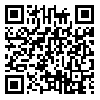BibTeX | RIS | EndNote | Medlars | ProCite | Reference Manager | RefWorks
Send citation to:
URL: http://tumj.tums.ac.ir/article-1-332-en.html
Background: The irritable bowel syndrome (IBS) is one of the most common chronic medical conditions. Various mechanisms, including altered gut flora and/or small bowel bacterial overgrowth, have been suggested to play a role in the development of gas-related symptoms aim of study. The clinical evidence of small intestinal bacterial overgrowth as an important etiology of irritable bowel syndrome continues to accumulate. Clinical symptoms of bacterial overgrowth and irritable bowel syndrome are similar however, a definitive cause-and-effect relationship remains unproven. It is unclear whether motility dysfunction causes bacterial overgrowth or gas products of
enteric bacteria affect intestinal motility in irritable bowel syndrome.
Methods: In a randomized double-blind placebo-controlled trial consisting of treatment with bismuth subcitrate. Primary efficacy variable was subjective symptoms frequency of abdominal pain, Number of bowel movement & Bloating/distension.
Results: 119 patients were enrolled (59 bismuth subcitrate and 60 placebo recipients). At the end of phase 2, all symptom scores dropped significantly both in bismuth subcitrate and placebo group (p<0.001). There was not a significant difference in symptom relief with bismuth subcitrate versus placebo administration.
Conclusions: There was not a significant difference in symptom relief with bismuth subcitrate versus placebo in IBS patients. Whether antibiotics can improve quality of life in patients with irritable bowel syndrome warrants further research.
Interventions: Participants were randomly assigned to receive 120mg bismuth subcitrate four times daily for 14 days (n=59) or placebo (n=60).
| Rights and permissions | |
 |
This work is licensed under a Creative Commons Attribution-NonCommercial 4.0 International License. |





